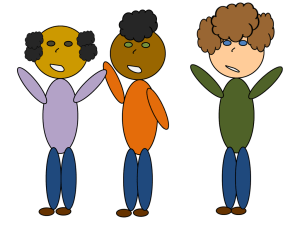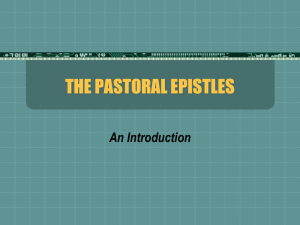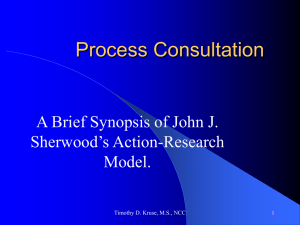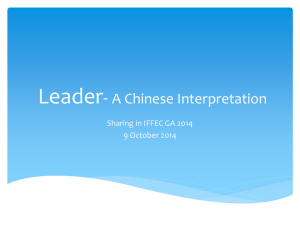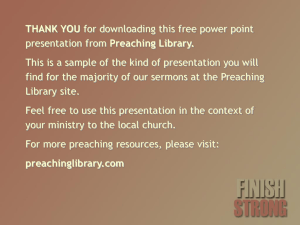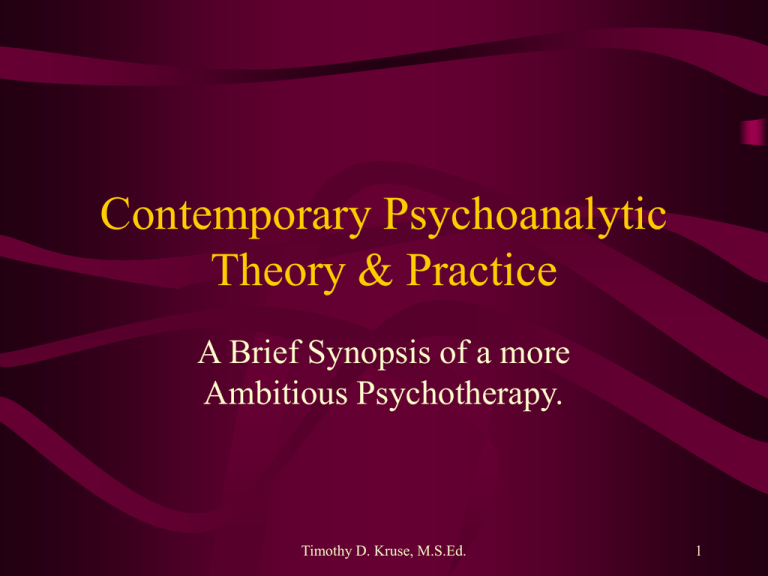
Contemporary Psychoanalytic
Theory & Practice
A Brief Synopsis of a more
Ambitious Psychotherapy.
Timothy D. Kruse, M.S.Ed.
1
Contemporary Psychoanalytic
Theory & Practice
• For the confidential use of Counseling
Theory students.
– Permission to quote, distribute, or reproduce in
any form any of these materials is expressly
denied.
Timothy D. Kruse, M.S.Ed.
2
Psychology
Heraclitus / Bathun psyche
• Psyche (Greek) for Soul (vs. Behavior)
-You can never grasp it by itself apart from other
things, perhaps b/c it is like a reflection in a
flowing mirror, or like the moon which mediates
only borrowed light. (J. Hillman)
• Logos (Greek) for meaning / way of / reason /
logic of / word
Timothy D. Kruse, M.S.Ed.
3
Friedrich Nietzsche
The “true” founder of modern psychology (L. Klages)
• The content of our conscience consists of all
that which, in childhood, was demanded
from us, without explanation and regularly,
from persons we respected or feared…Faith
in authority is the source of conscience; it is
not the voice of God in man’s breast, but the
voice of men in man.
Timothy D. Kruse, M.S.Ed.
4
Friedrich Nietzsche
• Everyone is the farthest to himself.
• A quantum of dammed up (psychic) energy
exists in all.
• Man is something that must be overcome.
• Good actions are sublimated evil ones.
• In the last analysis, [man] gives nothing but
his own biography.
Timothy D. Kruse, M.S.Ed.
5
Sigismund Schlomo
A.K.A Sigmund Freud
• [I have] completed an undertaking which a
number of people, still unborn but fated to
misfortune, will feel severely.
• An intimate friend and a hated enemy have
always been necessary requirements of my
emotional life…I always knew how to
provide myself with both over and over.
Timothy D. Kruse, M.S.Ed.
6
Sigmund Freud
• Ignorance is ignorance; no right to believe
anything can be derived from it. In other
matters no sensible person will behave so
irresponsibly or rest contentment with such
feeble grounds for his opinions and for the
line he takes. It is only in the highest and
most sacred things that he allows himself to
do so.
Timothy D. Kruse, M.S.Ed.
7
James Hillman
Psychology vs. ???
• Where there is a connection to the soul,
there is psychology; where not, what is
taking place is better called statistics,
physical anthropology, cultural journalism,
or animal breeding. [or cognitive
behaviorism?]
Timothy D. Kruse, M.S.Ed.
8
David Bowe
Life is the consistent persistence of
Rage.
Timothy D. Kruse, M.S.Ed.
9
Contemporary vs. Classical
Psychoanalysis
• Psychoanalysis
• Psychoanalytically Informed Psychotherapy
• Insight Oriented Psychotherapy
• Exploratory / Uncovering Psychotherapy
Timothy D. Kruse, M.S.Ed.
10
Contemporary Psychoanalytic
Theory
• The synergistic effect of four analytic
theories…
–
–
–
–
Drive Theory (classical Freudian)
Ego Psychology (Tripartite Psychic System)
Self Psychology (H. Kohut)
Object Relations (British school of PA)
Timothy D. Kruse, M.S.Ed.
11
Drive Theory
Classical Freudian Psychoanalysis / Biological Determinism
• Biologically based instincts prominent
(libido /aggression)
• Modern perspective = “unconscious wishes
and desires”
• Sexual (bodily) development important
determinant of conflict areas
Timothy D. Kruse, M.S.Ed.
12
Ego Analytic Psychology
Contemporary Freudian Psychology / Erikson (1950) & Rapaport (1958)
• Adaptation and regulation of unconscious drives
(Ego Strength) prominent (Tripartite System).
• Primary and secondary ego defense mechanisms.
• Non-conflicted areas of mental function are
resources (intelligence, perception, memory, etc.) .
• Bio / psycho / social perspective on the human
condition (emotions, cognitions, behavior).
Timothy D. Kruse, M.S.Ed.
13
Ego Psychology (cont.)
• The Freudian Tripartite System…review
– The Id (“It”) contains primitive drives, impulses,
prerational/prelogical strivings, wish-fear combinations,
primary process thought and fantasies.
– The Ego (“Me”) adapts Id energies to life’s exigencies,
finding acceptable outlets for strivings. (Observing and
Experiencing Ego).
– The Superego (“Above me”) is the judicial branch.
Provides a moral perspective that impinges upon Id
energies and Ego adaptations.
Timothy D. Kruse, M.S.Ed.
14
Self Psychology
Heinz Kohut
• Development and regulation of self-esteem and
self-worth defines characterological,
temperamental traits and dispositions
• Early parent-child relationships important in selfesteem development and learned aspects of
regulation
• Separation/individualization important
developmental task
Timothy D. Kruse, M.S.Ed.
15
Object Relations Theory
Klein / Faribairn / Winnicott / Jacabson / Kernberg
• Relational / Structural Model.
• Humans have an innate drive to form and maintain
relationships.
• Memories (organized cognitive and emotional
schemata) of important objects from the past
organize wishes, behavior, perception, and
meaning of current interpersonal and intrapsychic
functioning.
– Internal and external Object Representations.
– Object Constancy.
Timothy D. Kruse, M.S.Ed.
16
Philosophical Support System
• Friedrich Nietzsche (Enlightenment Philosophy)
– Man is a self-deceiving creature
• Primary & Secondary Ego-defenses
• Therapist should draw inference based on what we mean vs.
what we say (Process vs. Content)
• Conscious – unconscious continuum
– Consciousness is “ciphered formula of the
unconscious” / (das Es) “id”
• To understand present character structure (behavior),
unconscious patterns and motives must be decoded
Timothy D. Kruse, M.S.Ed.
17
Philosophical Support System
• Darwinism (Social Darwinism)
– Instinct
• Replaced with the notion that “drives” are present
and equally influenced via developmental
experiences
• Survival of the Fittest!?
– Now includes environmental influences
Timothy D. Kruse, M.S.Ed.
18
O God, I could be bounded in a
nutshell and count myself a king
of infinite space, were it not that I
have bad dreams (Shakespeare's Hamlet).
Timothy D. Kruse, M.S.Ed.
19
Contemporary Psychoanalytic
Theory
The Fun Stuff
Psychotherapeutic Stance
Human Condition &
Characterological Issues
Timothy D. Kruse, M.S.Ed.
20
First…A Review!
Ego Defenses
Timothy D. Kruse, M.S.Ed.
21
Ego Defenses
• Two levels of ego defenses
– 1) Primary, Infantile, immature, lower-order,
primitive, pre-rational, archaic defenses.
– 2) Secondary, mature, higher-order defenses.
Timothy D. Kruse, M.S.Ed.
22
Primary Ego Defenses
• Involve the boundary between the Self and
the external world or reality.
• They are preverbal / prerational (oral) and
governed by primary process thought (i.e.,
deficit of the/in the reality principle).
• They lack an appreciation for separateness
and constancy of objects.
Timothy D. Kruse, M.S.Ed.
23
Primary Ego Defenses (cont.)
Boundary between Self and World
• Primitive withdrawal
or Autistic/Schizoid
fantasy
• Denial
• Omnipotent Control
• Primitive Idealization
& Devaluation
• Projective
Identification
• Splitting
• Dissociation
• Projection
• Introjection
Timothy D. Kruse, M.S.Ed.
24
Secondary Ego Defenses
• Deal with the internal / intrapsychic
boundaries between the Tripartite System
and between the Observing and
Experiencing Ego.
• They are considered higher order and at
times more adaptive. (Ego-strength)
Timothy D. Kruse, M.S.Ed.
25
Secondary Ego Defenses (Cont.)
Internal Boundaries
•
•
•
•
•
•
•
•
Repression
Regression
Isolation
Intellectualization
Rationalization
Moralization
Compartmentalization
Undoing
•
•
•
•
•
•
•
Displacement
Reaction Formation
Reversal
Identification
Acting Out
Sexualization
Turning Against the
Self
• Sublimation
Timothy D. Kruse, M.S.Ed.
26
Psychotherapeutic Stance
• Hermeneutic vs. Scientific / Empirical
Tradition
– Isolation of variables (parsimony) so that a
particular cause-and-effect process can be
exposed, uncontaminated by other possible
explanations is a woefully inadequate
representation of reality…
– …thus, the clients subjective experience can be
devalued, minimized, and impoverished.
Timothy D. Kruse, M.S.Ed.
27
Psychotherapeutic Stance (cont.)
• It is more important for the clinician to understand
people than it is to master specific treatment
techniques--Therapy taught backward.
• EVT’s do not take into account the vicissitudes of
the Human Condition--What helps one can
damage another!
i.e., Shame vs. Guilt / Depression vs. grief (Freud, 1917)
• Unless the clinician understands someone’s
unique, personal subjectivity, one cannot infer /
orient competent tx.
Timothy D. Kruse, M.S.Ed.
28
Psychotherapeutic Stance (cont.)
• By understanding the idiosyncratic way an
individual organizes knowledge, emotion,
sensation, and behavior, a therapist has more
choice about how to influence him or her and
contribute improvements sought.
• Unravel the different strands (not single event) of
causation…
– Eight Attending Areas (McWilliams, 1999)
• Temperament and fixed attributes, maturational themes, defensive
patterns, central affects, identifications, relational schemas, selfesteem regulation, and pathogenic beliefs.
Timothy D. Kruse, M.S.Ed.
29
The Human Condition
A brief synopsis
• The essential character structure cannot be
understood without an appreciation of two distinct
and interacting dimensions: developmental level
of personality organization and defensive style
within that level (McWilliams, 1994).
• 2 Dimensions of the Human Condition =
Developmental 1) Level & 2) Type of Character
Organization
Timothy D. Kruse, M.S.Ed.
30
Developmental Level of
Character Organization
• This dimension conceptualizes a person’s extent of
individuation or degree of pathology (i.e., Identity
Diffusion or Symbiosis). The three levels are…
– 1)Neurotic
• Oedipal (Freud), Initiative vs. Guilt (Erikson), Identity
Integration & Object Constancy (OR/Mahler)
– 2)Borderline
• Anal (Freud), Autonomy vs. Shame & Doubt (Erikson),
Separation/Individuation (OR/Mahler)
– 3) Psychotic
• Oral (Freud), Trust vs. Mistrust (Erikson), Symbiosis
(OR/Mahler).
Timothy D. Kruse, M.S.Ed.
31
Developmental Level of
Character Organization (cont.)
• Neurotic organization presents with…
–
–
–
–
–
–
–
–
Secondary, higher order, or mature defenses
Closed & inflexible ego defenses
Reality principle
Secondary process thought
Observing Ego
Ego Strength
Ego dystonic neurosis
Intact reality testing and object relations
Timothy D. Kruse, M.S.Ed.
32
Developmental Level of
Character Organization (cont.)
• Borderline organization presents with…
– Identity diffusion – the lack of an integrated
self concept and an integrated and stable
concept of total objects in relation to the self
(i.e., impaired object relations/auxiliary ego)
• …as manifested by a subjective experience of
chronic emptiness, contradictory self-perceptions,
contradictory behavior, impoverished and
contradictory perceptions of objects, and an inability
to convey interaction in a non-global fashion.
Timothy D. Kruse, M.S.Ed.
33
Developmental Level of
Character Organization (cont.)
–
–
–
–
–
–
–
Primary, infantile, immature ego defenses (splitting)
Chronic, diffuse, free-floating anxiety
Sporadic (situational) impairment in reality testing
Prepsychotic personality structures (anticipation)
Polymorphous perverse sexual trends
Impulse neurosis and addictions
Low level character disorders
• Hysterical, Narcissistic, Depressive-Masochistic, & Infantile
personality
– Polysymptomatic Neurosis
• Multiple phobias, dissociative reactions, paranoia, etc.
Timothy D. Kruse, M.S.Ed.
34
Developmental Level of
Character Organization (cont.)
• Psychotic organization presents with…
– Weak and infantile ego defense mechanisms
• So much so that they are overwhelmed by the external world
(congruent - bizarre delusions, hallucinations)
• Non objective evaluation and judgment of world outside of
self.
– Primary process thought
– Governed by the pleasure principle
– Gross impairment in reality testing (hallucinations,
delusions, illusions, etc.)
– Ego syntonic neurosis
– Symbiotic (narcissistic) fusion
Timothy D. Kruse, M.S.Ed.
35
Developmental Level of
Character Organization (cont.)
• The clinician must differentiate between
– 1) Symptom Neurosis.
– 2) Neurotic Character.
– 3) Psychosis (Narcissism).
Timothy D. Kruse, M.S.Ed.
36
Developmental Level of
Character Organization
Neurotic
Borderline
Psychotic
Developmental Type of Character
Organization
• The degree of individuation or
psychopathological phenomena.
• Predominant or Bedrock (stereotypical)
dispositional defensive operation.
• Formed by aligning constellations of central
primary and secondary ego defenses.
Timothy D. Kruse, M.S.Ed.
38
Sample Constellations
1. Narcissism = idealization, devaluation
2. Schizoid = primitive withdrawal,
autistic/schizoid fantasy
3. Paranoid = reaction formation, projective
defenses
4. Hysteria = repression, sexualization
5. Obsessional = isolation, rationalization,
moralization, compartmentalization,
intellectualization
6. Mania = denial
7. Phobic = displacement, symbolization
39
Developmental Level & Type of
Character Organization
Neurotic
Narcissistic
Schizoid
Depressive
Sociopathic
Paranoid
Hysteric
Obsessive /
Compulsive
Borderline
Psychotic
Developmental Level & Type of
Character Organization
• The aforementioned view of the Human
Condition provides contemporary
psychoanalysts to work within individual
psychologies.
– …and to do so during the analytic process.
Timothy D. Kruse, M.S.Ed.
41
…for there is nothing either good
or bad, but thinking makes it so.
(Shakespeare’s Hamlet)
Life is the existence of Degree
The art and science of Interpretation
Timothy D. Kruse, M.S.Ed.
42
The Degrees of the Human
Condition
• Id there such a thing as too much love?
– Narcissism…only if the self love is without
warrant…otherwise, it is astute and keen
observation into one’s self awareness.
• Id there such a thing as too little anger?
• Id there such a thing as too much joy?
Timothy D. Kruse, M.S.Ed.
43
Psychoanalytic Process
• Today, remains loyal to the Freudian process.
– Couch, duration, etc.
• Present in session…formulations outside of
session.
– Altering of transference issues.
• Provide insight into unresolved developmental
stages through the following…
– Transference/Counter-transference, free association,
dream analysis, resistance, analysis, and interpretation.
Timothy D. Kruse, M.S.Ed.
44

